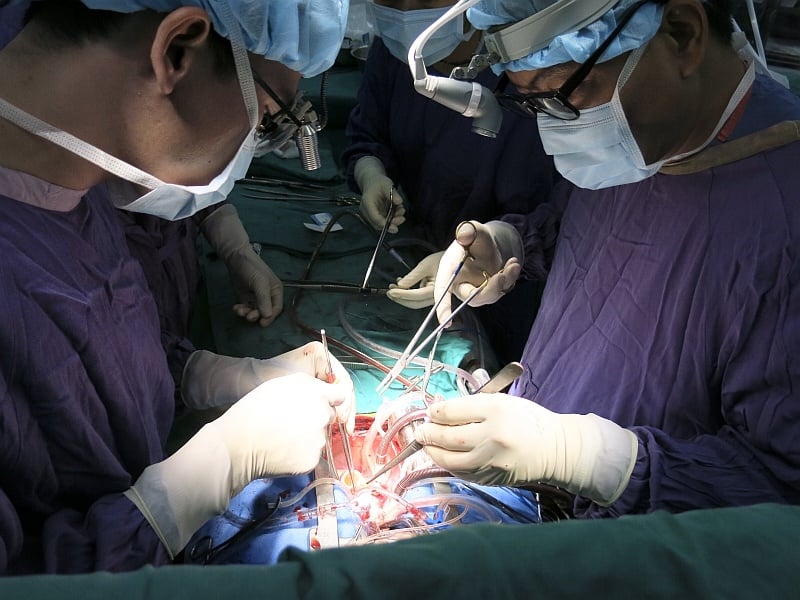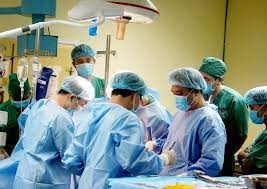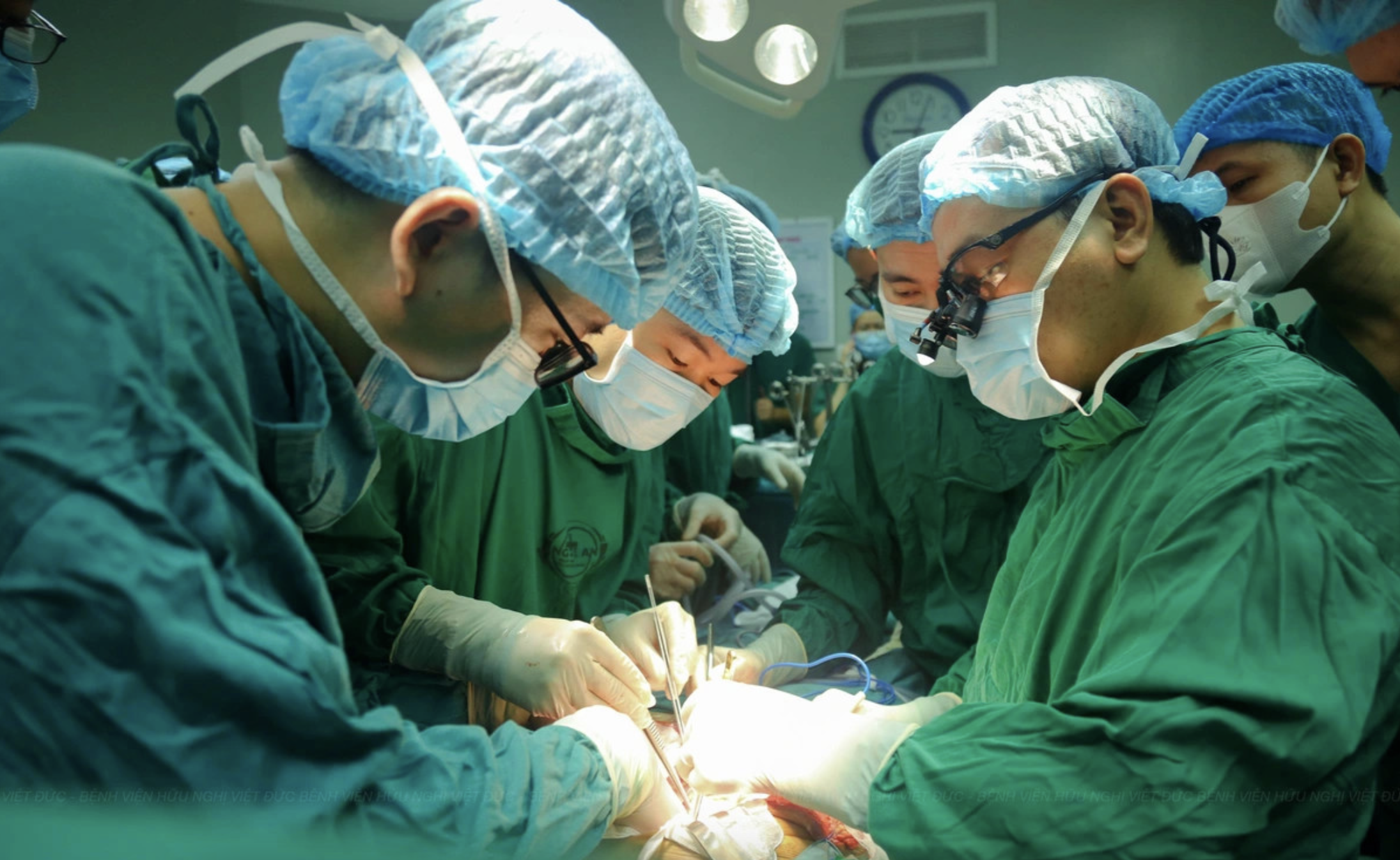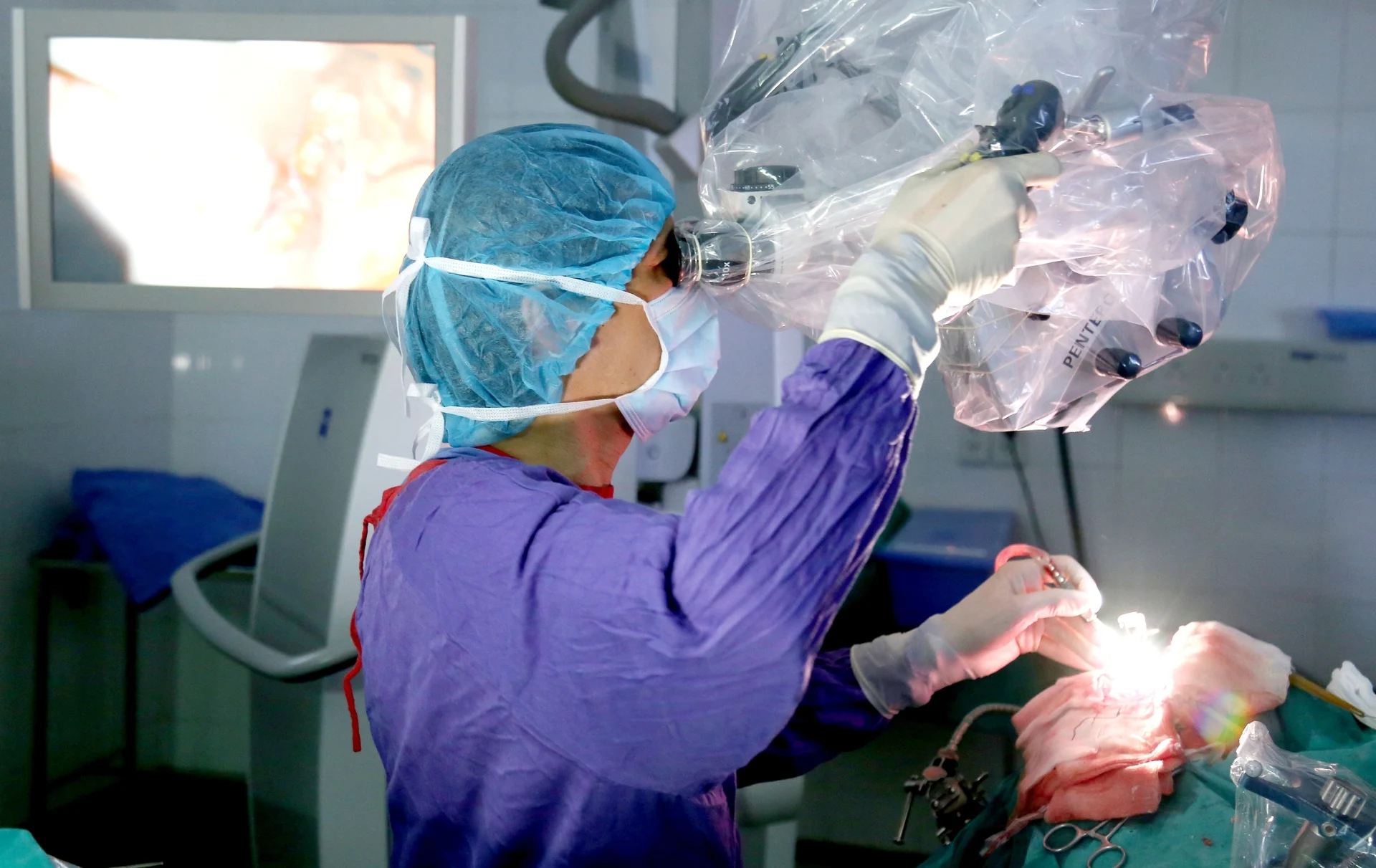Medical news on January 14: Record organ transplant at Viet Duc Friendship Hospital
Within six days (from January 6 to 11, 2025), Viet Duc Friendship Hospital successfully performed 21 organ transplants, including 15 patients whose lives were saved thanks to organs donated from 4 brain-dead people.
Four brain-dead people donated organs to save the lives of 15 patients at Viet Duc Friendship Hospital
Successful organ transplants include: 4 heart transplants, 1 simultaneous liver-kidney transplant, 3 liver transplants, 7 kidney transplants. Of which, a 63-year-old patient from Nam Dinh, with a history of liver cancer and stage V kidney failure, received a simultaneous liver-kidney transplant, an advanced medical technique performed for the first time in Vietnam in December 2019.
In addition, the hospital also performed 6 kidney transplants from living donors, bringing the total number of transplants in the week to 21. These surgeries were all performed under emergency conditions, with a team of doctors working tirelessly to ensure the lives of the patients.
 |
Doctors are performing an organ transplant at Viet Duc Friendship Hospital. Source: Viet Duc Hospital |
This success not only affirms the position of Viet Duc Friendship Hospital in the field of organ transplantation, but also opens up new hope for thousands of patients waiting for organ transplants nationwide. This is an important milestone, marking the hospital's continuous efforts in promoting organ donation and contributing to the community, and is also a testament to the kindness of organ donor families.
Entering 2025, Viet Duc Friendship Hospital continues to affirm its pioneering role in organ transplantation in Vietnam, bringing hope and life to many patients in critical condition.
Signs of adjustment disorder
Adjustment Disorder is a psychological disorder that occurs when a person has difficulty coping with major changes or stressful life events, leading to emotional or behavioral problems that cannot be resolved on their own.
This is a fairly common condition in modern society, especially when people are faced with constant stress from work, family, health or sudden events.
This disorder not only negatively affects the patient's quality of life, but can also lead to serious consequences if not detected and treated promptly.
Adjustment disorders often occur when an individual experiences a stressful event or major life change that they find difficult to cope with.
Common causes include: Changes in living conditions such as moving, changing jobs, or changes in health status; Major stressful events such as the death of a loved one, divorce, relationship changes, or facing crisis situations such as accidents, illness, or job loss. Prolonged stress due to work, financial, family, or relationship stress can cause difficulty regulating emotions and behavior.
Symptoms of adjustment disorder typically appear within three months of a stressful event and can last up to six months without timely intervention. Importantly, these symptoms will improve when the stressor is removed or reduced.
Some risk factors that may increase the likelihood of developing an adjustment disorder include: History of stress in childhood; Previous mental health problems; Difficult living circumstances; Vulnerable personality
Statistics show that women have a higher rate of adjustment disorders than men, and adolescents are also the most likely to be diagnosed.
If not treated promptly, adjustment disorders can lead to serious consequences such as impaired ability to work and study. Strained family and social relationships, which can lead to divorce or family conflict. Addictive disorders such as alcohol or drug addiction. More severe mental disorders, including depression, anxiety, and even suicidal thoughts and behaviors.
Adjustment disorders are usually treated in the short term, but if the stressor is persistent, longer-term treatment may be needed. Treatments include: Psychotherapy; medication; social support.
In addition, doctors also encourage patients to maintain a healthy lifestyle, including participating in physical activities, maintaining positive social relationships and practicing positive thinking skills to cope with stress.
Solutions for prevention and treatment of chronic kidney disease
Chronic kidney failure is a disease that is increasing in the community, especially among young people. According to doctors, irregular eating and living habits, along with factors affecting the modern living environment, are the main causes leading to the increase of this disease.
At the Center for Nephrology, Urology and Dialysis, Bach Mai Hospital, there are currently about 160-180 kidney patients receiving inpatient treatment, of which the number of young patients under 30 years old is increasingly large. On average, the center receives 30-40 new patients every day, and it is noteworthy that many of them are facing end-stage kidney failure, despite being very young.
According to Dr. Nghiem Trung Dung, Director of the Center for Nephrology, Urology and Dialysis, one of the main factors contributing to the increase in chronic kidney disease among young people is unscientific eating habits. Many young people today tend to consume too many drinks of unknown origin, processed foods, fast foods such as instant noodles, with high salt content, leading to increased burden on the kidneys. In addition, irregular living habits, such as sleeping late, lack of exercise, and obesity, are also major risk factors for kidney disease.
These bad habits not only harm the kidneys but also affect overall health, creating potential risks for other diseases. However, many people do not realize the seriousness of this condition until the disease has progressed seriously.
One of the serious problems of chronic kidney disease is that it often progresses silently, and the early stages of the disease often have no obvious symptoms. Therefore, early detection of chronic kidney disease is extremely important. However, many people still do not have the habit of regular health check-ups, which causes the disease to be detected late and makes treatment difficult.
When kidney disease is detected at a late stage, conservative treatments are no longer effective. At this point, patients only have a few alternative treatment options such as regular hemodialysis, peritoneal dialysis or kidney transplantation. Regardless of the method chosen, patients will face a burden of long-term illness and high treatment costs.
Many young patients, when diagnosed with kidney failure, feel surprised and confused because they did not have any obvious symptoms before. For example, patient M (30 years old, Bac Giang) shared that he discovered he had end-stage kidney failure while at work and had symptoms of abdominal pain and nausea. Before that, he had been living normally and did not think he would have kidney problems. “When I received the diagnosis, I was very surprised, now my life is upside down, I want to work but my health does not allow it,” said M.
Another case is patient H (30 years old, Hanoi). H discovered kidney failure during a routine health check-up and was warned by the doctor about proteinuria in the urine. Initially, H was only diagnosed with mild nephritis and treated conservatively. However, after a while, symptoms such as nausea, insomnia, and taste changes appeared, forcing H to go to Bach Mai Hospital for a re-examination. H was diagnosed with end-stage kidney failure and is currently waiting to undergo periodic dialysis.
According to Master, Doctor Pham Tien Dung, Center for Nephrology, Urology and Dialysis, chronic kidney disease is tending to be "younger" with many cases of patients only 15-16 years old but already suffering from end-stage renal failure. Unfortunately, most patients come to the center when the disease has progressed too late, when kidney function is severely impaired and conservative treatment measures are no longer effective.
Early detection of chronic kidney disease is very important. According to doctors, if kidney disease is detected and treated promptly, patients can prolong the time of conservative treatment with low cost and high efficiency. However, when detected late, the cost of treatment will increase, the time of conservative treatment will be shortened and the patient's quality of life will be seriously affected.
Director of the Center for Nephrology, Urology and Dialysis, Dr. Nghiem Trung Dung, emphasized that regular health check-ups are the only way to detect kidney diseases early. If not detected early, kidney disease can progress very quickly, making treatment methods such as dialysis or kidney transplant no longer feasible. In addition, maintaining a healthy lifestyle, eating scientifically and exercising regularly are also important factors in preventing chronic kidney disease.
Chronic kidney failure is not only a problem for the elderly, but is becoming an increasingly common disease among young people. Unscientific eating and living habits, along with the lack of regular health check-ups, are creating a favorable environment for the disease to develop. For effective prevention and treatment, everyone needs to raise awareness of kidney disease and build a healthy lifestyle, and do not forget to have regular health check-ups to detect health problems early, thereby protecting kidney health and long-term quality of life.
If there are any signs of adjustment disorder, the patient should go to a specialized medical facility for timely consultation and treatment. Early treatment will help prevent the disorder from lasting and minimize the risk of developing into other serious psychological disorders.
In particular, for those with family or friends who have weak personalities and are prone to anxiety, creating a positive and caring environment is very important. A healthy living environment, good social connections and the ability to cope with stress will help reduce the risk of developing adjustment disorders and related psychological problems.



![[Photo] Overcoming all difficulties, speeding up construction progress of Hoa Binh Hydropower Plant Expansion Project](https://vstatic.vietnam.vn/vietnam/resource/IMAGE/2025/4/12/bff04b551e98484c84d74c8faa3526e0)


![[Photo] Closing of the 11th Conference of the 13th Central Committee of the Communist Party of Vietnam](https://vstatic.vietnam.vn/vietnam/resource/IMAGE/2025/4/12/114b57fe6e9b4814a5ddfacf6dfe5b7f)


























































































Comment (0)